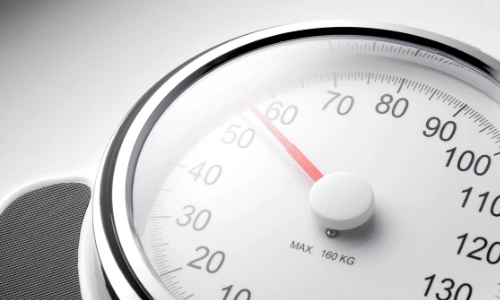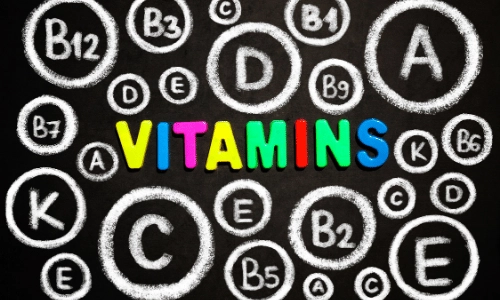“Can I Take Vitamins to Gain Weight?” was written by Gabrielle McPherson, MS, RDN, LD. Updated by Katie Dodd, MS, RDN, CSG, LD, FAND.
Many people have asked: “Can I take vitamins to gain weight?”
The short answer is, no. Vitamins alone do not contribute to weight gain. In fact, vitamins do not have the calories needed for weight gain.
In this article, we are going to dive into the question “Can I take vitamins to gain weight?” And we will discuss how you can successfuuly gain weight.
Are You Having Trouble Gaining Weight?
Are you having trouble gaining weight? Weight loss is the body’s response to not getting enough nutrition from food.
Many factors play into not being able to get enough to eat. There’s illness, disability, poor dental health, chewing and swallowing difficulties, decreased hunger and thirst, and more. These factors create significant challenges to getting the calories and nutrients you need to maintain good health.

Weight gain is a priority in those who are underweight because underweight increases the risk of death in the elderly (1).
If you’re having trouble with weight gain, you might wonder if you can take vitamins to gain weight.
Let’s review why vitamins are essential, if you can use vitamins to gain weight, and tips for increasing your calorie intake.
Why are Vitamins Important?
Every second of the day, your organs and body systems are working hard to keep us alive and well.
Our bodies metabolize- or break down- the foods we eat to use for energy. Energy is used to fuel processes like the movement of food through your intestines, breathing, and the rhythmic beating of your heart.

Vitamins are essential in helping with these metabolism processes (2).
There are 13 essential vitamins that we must get from the foods we eat to help meet our nutrition needs. (3,4).
Vitamins play specific roles in your body to keep your health optimal.
There are two types of vitamins: fat-soluble and water-soluble.
Fat-Soluble Vitamins
There are four fat-soluble vitamins:
- Vitamin A
- Vitamin D
- Vitamin E
- Vitamin K
Water-Soluble Vitamins
There are nine water-soluble vitamins:
- Vitamin C
- Thiamin (Vitamin B1)
- Riboflavin (Vitamin B2)
- Niacin (Vitamin B3)
- Pantothenic Acid (Vitamin B5)
- Vitamin B6
- Biotin (Vitamin B7)
- Folic Acid (Vitamin B9)
- Cobalamin (Vitamin B12)
Can I Take Vitamins to Gain Weight?
The quick answer is no.

In general, weight gain happens when you’re taking in more calories from food than you’re able to burn consistently.
Several factors play into your body’s ability to gain weight including age, gender, genetics, disease, physical activity, etc.
People gain weight from the major components of foods- also known as macronutrients.
Carbohydrates, fats, and proteins are macronutrients that contain calories.
Every gram of carbohydrates has four calories, every gram of fat has nine calories, and every gram of protein has four calories.
Vitamins are micronutrients that naturally don’t contain calories– which means they cannot contribute to weight gain.

How Vitamins Can Impact Weight
However, if you’re deficient in vitamins, weight gain may be difficult to attain. Thiamin and Iron deficiencies are associated with poor appetite, which can lead to weight loss (5, 6).
A zinc deficiency can impact your taste and smell, which can reduce your intake of foods- also limiting your chances for weight gain (7). Zinc may help stimulate appetite if you have a zinc deficiency (8).
Lastly, B vitamins are linked to increased body fat but there’s no solid evidence that they cause weight gain (6).
How Do I Gain Weight?
So if vitamins aren’t the answer, how do you gain weight? There are several things you can do.
Get Checked for Micronutrient Deficiencies
If you are experiencing a poor appetite, ask your medical provider if blood work should be obtained to determine if you have any vitamin deficiencies that could be the cause.
Seek Treatment for Possible Underlying Medical Conditions
You may have something going on in your body that is causing you to expend more energy while you’re resting. Diseases like cancer, congestive heart failure, and diabetes can cause you to burn more calories, putting you at risk for weight loss (9).
Eat High-Calorie Nutrient-Dense Foods

Eating high-calorie nutrient-dense foods increases your chances of gaining weight.
If you aren’t able to consume large portions of foods at one time, that’s okay.
You can maximize your calorie intake by making sure you’re eating three meals and two to three high calorie snacks daily.
If it’s a struggle to eat that many meals and snacks, it can be helpful to make protein shakes and drink them when you may not feel like eating a meal. You can drink protein shakes as a snack or even along with a meal.
You might consider tracking when you’ve eaten so that you don’t forget to eat. It’s best not to go longer than three to four hours without eating. See the list below for examples of high-calorie foods and protein-rich foods. Eating protein-foods can also help with weight gain and preventing muscle loss.
Check out our Weight Gain Food List for more information.
Foods to Gain Weight
Here are some foods high in calories that can help you gain weight:
Grains
- Rice
- Pancakes/Waffles
- Oatmeal
- Whole Wheat Bagels
- Pasta
Vegetables
- Sweet Potatoes
- Squashes
- Peas
- Corn
Fruits
Dairy
- Whole Milk
- Whole Milk Yogurt
- Cheese
- Cream Cheese
- Ice cream
Protein
- Salmon
- Sardines
- Nuts/nut butter
- Seeds
- Beans

Add Calorie Boosters to Your Day
Easy calorie boosters are foods you can pour in, mix in, or spread onto foods you like to eat to maximize the number of calories you’re eating.
- Pour-ins: heavy cream, olive oil, avocado oil, whole milk
- Mix-ins: granola, oats, ground flaxseeds, shredded cheese, mayonnaise, powdered milk
- Spreads: butter, cream cheese, avocado, hummus, peanut butter
Here are some examples of ways to use “pour-ins,” “mix-ins,” and “spreads.”
- Heavy cream goes well poured into soups, smoothies, oatmeal, or hot beverages.
- Foods like shredded cheese and mayonnaise can be mixed into scrambled eggs.
- Spreading peanut butter or cream cheese on a slice of banana bread adds lots of extra calories.
Follow a Weight Gaining Meal Plan
Another helpful tool to help you gain weight is a weight gaining meal plan.
We have a FREE meal plan we created just for you. It has 7-days of delicious high calorie meals. Each day provides over 3,000 calories. You can check out the article and meal plan here: Free 7-Day Weight Gaining Meal Plan [3,000+ Calories]

Gaining Weight Made Easy Course
If you are looking for even more support to make it easy to gain weight, be sure to check out our signature Gaining Weight Made Easy course.

Conclusion: Can I Take Vitamins to Gain Weight?
It’s no secret vitamins play a vital role in maintaining good health. Though you cannot use vitamins to gain weight because they do not contain calories.
However, preventing vitamin deficiencies can help you avoid a poor appetite.
Talk with your doctor about getting blood work if you suspect you may have micronutrient deficiencies. Eat high-calorie high-protein meals, snacks, and shakes everyday. Calorie boosters are easy ways to make your foods more rich in calories and protein so you have every opportunity to gain some extra pounds.
References:
- https://pubmed.ncbi.nlm.nih.gov/27570944/
- https://journals.sagepub.com/doi/abs/10.1177/147323000703500301
- https://www.annualreviews.org/doi/abs/10.1146/annurev-nutr-082117-051628
- https://www.ncbi.nlm.nih.gov/pmc/articles/PMC6099991/
- https://www.ncbi.nlm.nih.gov/pmc/articles/PMC6392124/
- https://pubmed.ncbi.nlm.nih.gov/32497136/
- https://pubmed.ncbi.nlm.nih.gov/27178656/
- https://pubmed.ncbi.nlm.nih.gov/21846317/
- https://www.sciencedirect.com/topics/biochemistry-genetics-and-molecular-biology/basal-metabolic-rate

Thank you for the help! What do you recommend for my 1 year old to gain weight. He is so tiny and has food diversions. I’m worried sick.
I’d recommend talking to your pediatrician and seeing if you can get a referral to a Registered Dietitian. Best of luck!
Thank you so much for your valuable information on weight gain.
You’re welcome!
Thanks so very much your information has been of help to me
I’m so glad! You are welcome.
For how long should i used this apetamin Syrup…
Hi Selma! I actually do not recommend aceptamin syrup. This supplement is not approved by the FDA and has some pretty concerning side effects associated with it.
For weight gain, I recommend eating high calorie foods. I have a lot of articles on this topic here: https://thegeriatricdietitian.com/high-calorie/
Best of luck!!